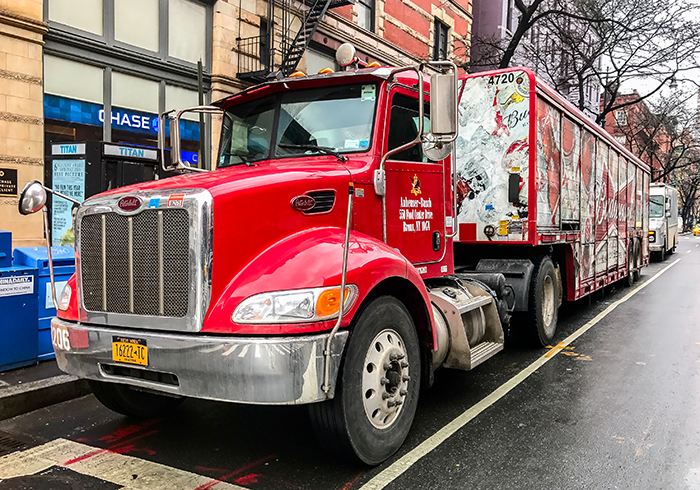Even largest shippers struggle with real-time visibility
William B. Cassidy, Senior Editor | Nov 06, 2017 2:03PM EST
The efforts of Anheuser-Busch InBev illustrate that real-time shipment visibility is elusive for shippers large and small. Photo credit: Shutterstock
Anheuser-Busch InBev seeks a special ingredient that would make its supply chain flow as smoothly and freely as lager from a tap: dynamic, real-time shipment data. To get that data, the brewer of Budweiser and more than 100 other brands of beer and ale is partnering with Convoy.com, a technology-enabled trucking marketplace that connects shippers to truckers.
Securing capacity is a priority for shippers today, but that isn’t Anheuser-Busch’s primary goal in this multi-year partnership with Convoy. “This was not a capacity play; this was an efficiency play,” said Ties Soeters, vice president of logistics procurement for the brewer. Anheuser-Busch wants greater supply chain efficiency, and greater transparency among its partners.
The shipper can only get what it wants by better collecting and crunching data — a key goal of the Convoy partnership. “We’re looking at this from a multiyear perspective,” Soeters said. The relationship “will be data-driven, analytical and help us gain insight into operations to drive efficiency on my end and create trust” between Anheuser-Busch and its transportation partners.
Inefficiency, along with lack of trust and transparency, sours the supply chain, either creating additional problems, such as a driver shortage, or intensifying them, pushing transportation costs higher, Soeters said in an interview. The agreement with Convoy is one of several Anheuser-Busch partnerships aimed at driving inefficiencies from its processes.
“Inefficiency doesn’t benefit anyone,” he said. “There’s inefficiency overall in the interaction between the shipper, the broker, the carrier and the truck driver. When we use data to drive decision-making and take greater responsibility for decisions, there are benefits for all parties.” Those benefits include, he said, better working conditions and pay for truck drivers.
“If there’s a better way for the truck driver to find a load, it’s better for us and better for the broker and carrier,” Soeters said. At a time when delaying a driver at a pickup or delivery site can cost a shipper its carrier, let alone detention fees, Anheuser-Busch wants to use shipment “DNA” data collected by Convoy to better analyze and then optimize its distribution network.
“We want to know the dwell times at our facilities, and how that dwell time impacts the driver experience,” Soeters said. “If it takes a guy five hours versus two hours to unload, how does that affect how we’re perceived as a shipper? We want to be able to set performance targets for our facilities based on driver experience, to identify the facilities where we have issues.”
That knowledge will only become more important as a stronger US economy generates more freight demand, consuming more available capacity. The electronic logging device mandate that takes effect Dec. 18 also is expected to tighten capacity by reducing trucking productivity as more accurate management of hours cuts into the number of miles truckers may drive in a day.
Soeter hopes the first-to-last-mile shipment data Anheuser-Busch will glean from using Convoy to match freight and trucks will also give drivers hauling its beer more loaded miles, and more pay. Many truck drivers will find that attitude, coming from a shipper, downright refreshing. To Soeter, making Anheuser-Busch a more attractive source of freight simply makes sense.
“We’re working with companies, including Convoy, that are looking at the market differently than others have historically,” he said. “We have 12 breweries throughout the US and we have to make decisions on how we optimize the supply chain,” he said. “This will help us make better decisions on where and when to brew our beer, and I think for us, that’s the bigger play.”
For Convoy, which launched its technology-based trucking platform in 2015, the multi-year pact with a company that has nearly $40 billion in worldwide annual revenue is another proof of concept moment that lends it credence in a skeptical marketplace. The agreement follows a $62 million investment from start-up investor Y Combinator’s Continuity growth fund in July.
Other investors in the “Uber for Trucking” company include Amazon.com founder Jeff Bezos, and Marc Benioff, founder and CEO of Salesforce, as well as Greylock Partners. The Seattle-based company, founded by CEO Daniel Lewis and chief technology officer Grant Goodale, has raised more than $80 million to date in three rounds of investment.
Convoy began beta-testing in and around Washington state two years ago and has expanded its network of carriers, which now includes more than 10,000 trucking companies, across the US. The Convoy platform generates unique pricing for loads that is guaranteed for shippers and carriers, and promises to pay drivers within 24 hours of completing a delivery.
The ability to obtain dynamic pricing, and pricing transparency, were factors that attracted Anheuser-Busch. “Over the last two years or so we’ve focused our attention on new innovation in technology within the trucking sphere, looking at areas such as dynamic pricing, price hedging,” Soeters said. “Transparency among drivers, brokers and shippers, we believe in that.”
Convoy will be one of many brokers and carriers used by the brewer, which expects to increase its involvement and investment in transportation technology. “The trucking industry is one of the most exciting places to be in right now, thanks to the evolution of technology. We’re looking to improve the shipper-carrier relationship in a way that grows both sides of the pie.”

No comments:
Post a Comment